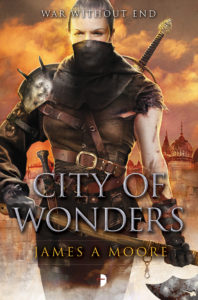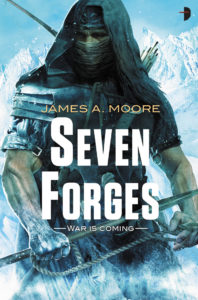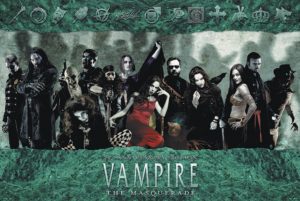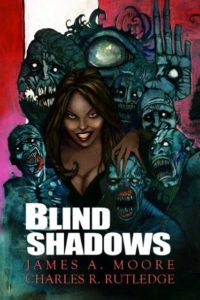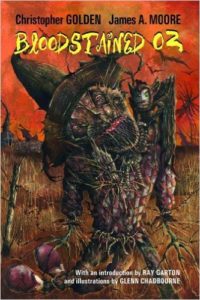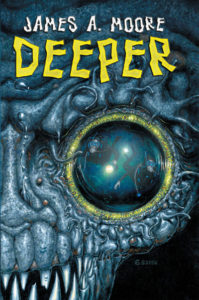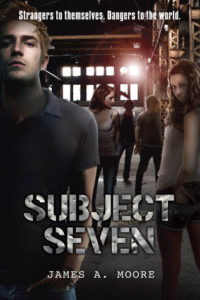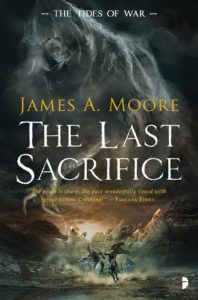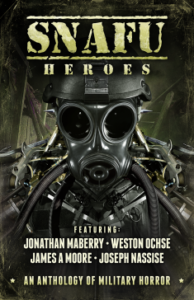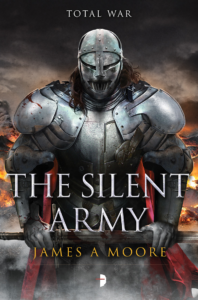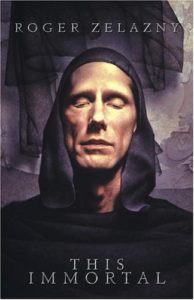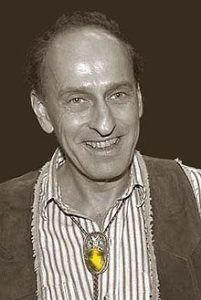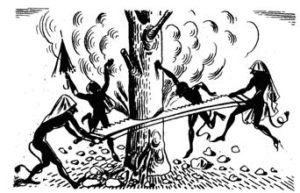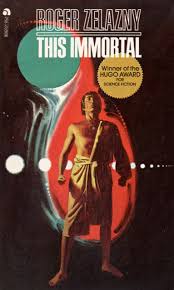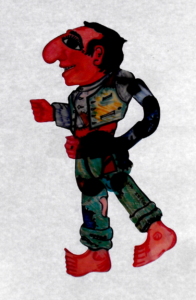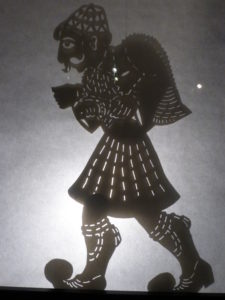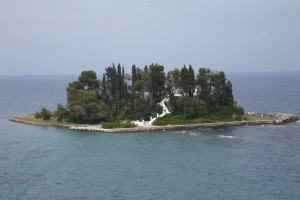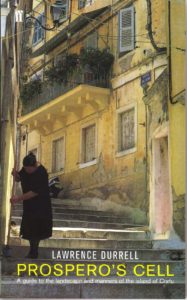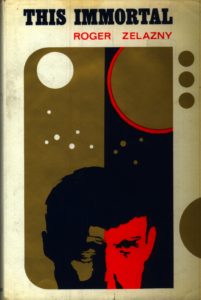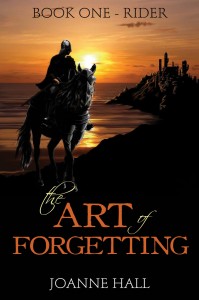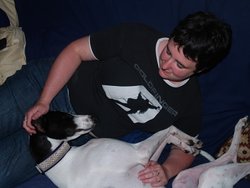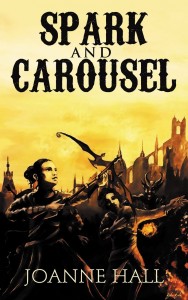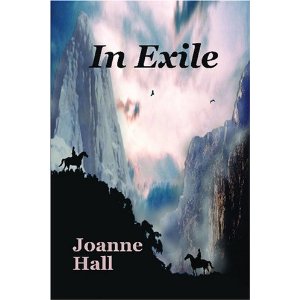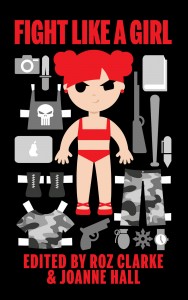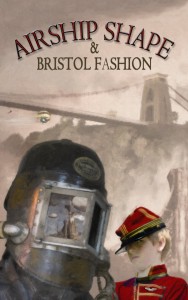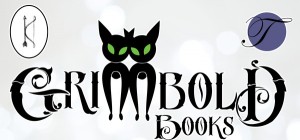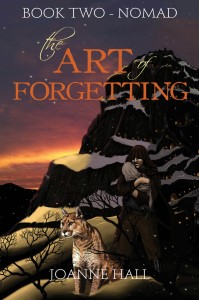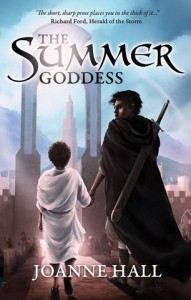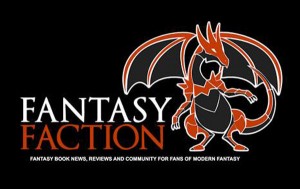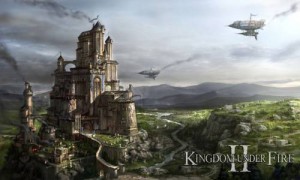Had enough period and classic scares for a day or so? No, neither have we, but it’s time to be modern again. Join us now, dear listener, as we embrace 2017 and bring you grimdark, role-playing games and horror. It took some time to find the right chains, but at last we got that prolific fantasy author James A Moore at our mercy. We say fantasy author, but there’s much more to his work. As you will find out below…
An Interview with James A Moore
greydog: Welcome to greydogtales, James. We’re partly here for your latest book, The Last Sacrifice, but we like to drift and potter about as well. So we’ll start with the broader nonsense. For those who don’t know you, tell us a bit about yourself, either as a writer, or as a mostly human being.
james: As a writer I focus on horror and grimdark, on supernatural crime fiction and weird westerns. In other words I write what ever strikes my fancy. I promised myself a long time ago that I would always aim to write the book I would like to read and I’ve stuck to that.
As a person, I am a comic book geek (I’ve written a few of those in my time, too) and I am a movie buff. I work at a local Starbucks so I don’t become a hermit and because I absolutely love medical benefits, having a 401K and stock options, you know, all of the stuff being a writer does not cover. I am a widower who lost his wife seven years ago.
greydog: Although you’ve written all sorts, including horror, a lot of people probably know you as a fantasy author. Fantasy is an enormous genre which covers everything from icky tales of nice fairy-folk to large scale disembowellings and chaotic perversions. Is there such a thing as grimdark, and if so, do you write it?
james: I tend to think that there is such a thing and yes, I write it. I love high fantasy stories, I just don’t really write them. I want swords and anger and bloodshed and fear and humor and the occasional romance (even if it doesn’t work out) and I want to study the human condition in my writings. And I think that, really, the best way to know people is to see how they handle adversity.
greydog: You caught attention with your epic fantasy series Seven Forges, which we think is now up to four books and several short stories. Is this a core work for you, or one that you were just passing through?
james: I love fantasy. I always have. I love horror, too. When it comes to Seven Forges I had an idea that simply would not leave me alone, which is what normally starts me on a book or a series. I loved the idea of seeing a massive, stagnating empire go up against a group that was smaller, but far more dedicated to winning. This is definitely a core for me. I have at least three more novels planned in the series, and likely several more short stories and novellas as well. It’s a big world and it’s going through some seriously violent changes. I love watching that happen.
greydog: You also did an awful lot for White Wolf, on their World of Darkness role playing games and supplements. We remember buying Vampire: Masquerade when it first came out. Does that mean that you are, or once were, an RPGer yourself?
james: Oh my, yes. I used to play D&D and all of the WOD games, as well as Champions (remember, comic book geek). And I was the Storyteller on a lot of the adventures I wrote for White Wolf. My players were my sounding board (or, you know, victims. It’s all a matter of perspective). I ate those games like candy. I don’t have the time to play the games any more, much as I might like to.
greydog: No, those vast chunks of time needed for serious RPGing do seem to get fewer and fewer. So, you’ve worked with writers Christopher Golden and Charles R Rutledge, amongst others. Do you find co-authoring a pleasure, or harder work than being left along to do your own thing?
james: Honestly, I wouldn’t do it if I didn’t love it. I have projects going with Charles and with Chris both, but it might take a while to get to them, priorities being what they are. BLOODSTAINED WONDERLAND is coming out later this year with Chris, and A HELL WITHIN (A Griffin & Price novel) is coming out later this year with Charles.
For me those collaborations are like getting all of my favorite toys and having them get all of their favorite toys and then playing in the sandbox together. Only no sand in the underwear. Later this year I am also part of a mosaic novel with Christopher Golden, Cherie priest, Charlaine Harris, Jonathan Maberry, Kat Richardson, Tim Lebbon, Mark Morris, Kelley Armstrong and Seanan McGuire…THAT is a damned big sandbox.
greydog: As an aside, are we likely to see any more stories in the unpleasant land of Bloodstained Oz, the Stoker-nominated limited edition you released some time ago?
james: Oh yes. BLOODSTAINED WONDERLAND is finished. In the coming months Chris and I will be plotting out and then writing BLOODSTAINED NEVERLAND. They are light and cheerful stories, assuming your mind is a cesspool of violence and urban decay.
greydog: Which piece of work has given you the most personal satisfaction?
james: All of them. But if I have to pick one, it’s the SEVEN FORGES series, because there’s a lot of world building going on there and I wasn’t sure if I could pull it off. Or maybe DEEPER which was my first ever attempt at a first person novel. Possibly BLOOD RED, which was the fastest I’ve ever written a novel…the list goes on, seriously.
greydog: And which of your works do you wish more people had read, or knew about?
james: That is definitely an ALL of them answer. I’m delighted with the attention SEVEN FORGES has gotten, but I’d love more people to know about it, and while I’m dreaming if HBO or Netflix wants to make a series… The one I think deserved more attention than it got was SUBJECT SEVEN, which is a Young Adult series I did there were plans for more books but the sales simply weren’t there. Lots of great reviews and even some fan mail, but at the end of the day it got lost in a sea of YA novels.
James A Moore on The Last Sacrifice
greydog: On to your most recent novel, The Last Sacrifice, before we forget. It’s a dark and lively piece, with a lot of serious action and a number of key strands. What made you choose to pursue multiple characters, rather than, say, only following Brogan’s misfortunes?
james: I always prefer multiple characters and points of view, because I think it’s fun letting readers see and understand the things that a lot of the characters do not get to see. I’m writing the sequel right now and for a decent portion of the book Brogan is out of the conflict and on a quest. Meanwhile his companions are waist deep in trouble and blood.
greydog: It’s possible to sympathise with the main protagonists of Last Sacrifice, but most of them aren’t exactly innocents. Moderately ‘good’ people do moderately ‘bad’ things, for starters. Is this a moral shadowland that you like your characters to tread?
james: I love shades of gray (not fifty of them mind you). I have seldom met anyone over the age of five who could be called all good or all bad. I think it’s important to show that. Brogan isn’t a bad man. He’s done bad things and he’s been paid for it, but he’s generally a good man who loves his family, he also has to deal with his anger and grief when things go wrong and he does not deal with it well.
We’re introduced to SOME of the 20 men with him in book one, but more of them are met in the second book and the same is true of the slavers who are after him. A lot of them are pretty much like the personnel on the Death Star. They’re just doing their jobs, you know? Is it morally wrong to be a slaver? Not to them. It’s a different world.
greydog: We don’t get time to read a lot of fantasy these days, but the Undying or He-Kisshi are a new one on us (having dubious tastes, we liked them more than some of the people). Their role and their physical nature are nicely brought out through the book. How did they come about?
james: I said before that I love high fantasy, but the thing is, I need to do something different. I love me some elves and dragons and dwarves but for now I want to stay away from the tropes and come up with new threats. The He-Kisshi are some tough characters, they have limitations but they really are undying. They are the messengers of the gods and in this case that means that have the ability to act on behalf of the gods.
One of the things I wanted to do with them is show that they are, in fact, connected deeply with the gods and when the gods start going off the rails, so do some of the He-Kisshi. They get a lot more play in the second book and we get to see some of the reasons that they are so deeply feared.
greydog: We know that Last Sacrifice has only been released recently, but we assume you have many plans. Anything you’d share with us, or tease us with, on this series or other projects?
james: There will be two more books in the TIDES OF WAR series. The Last Sacrifice is only book one. Things in the works? I plan on finishing two horror novels this year, BOOM TOWN and FRESH KILLS, and I want to do a sci-fi horror story that will, hopefully, scare the crap out of people. So many books to write, so little time.
greydog: We look forward to those. Finally, dogs or cats? There is a wrong answer, but no actual penalty, though we do take notes on this sort of thing.
james: The actual answer is simple: Dogs or cats? May as well ask me if I prefer barbarian hordes or stealthy assassins. Both, of course. If given a choice of one and only one, I suppose dogs first.
greydog: What an excellent answer. Many thanks for joining us.
james: My absolute pleasure! Thanks for having me.
You can get hold of a copy of James A Moore’s The Last Sacrifice at the link below, and most of his work is easily available via one or other Amazon site. You’ll like the Undying.
Coming during the next couple of weeks: Christine Morgan’s collection of Viking tales, Lurchers for Beginners, more Women in Horror, and lots more goodies. Do join us…

